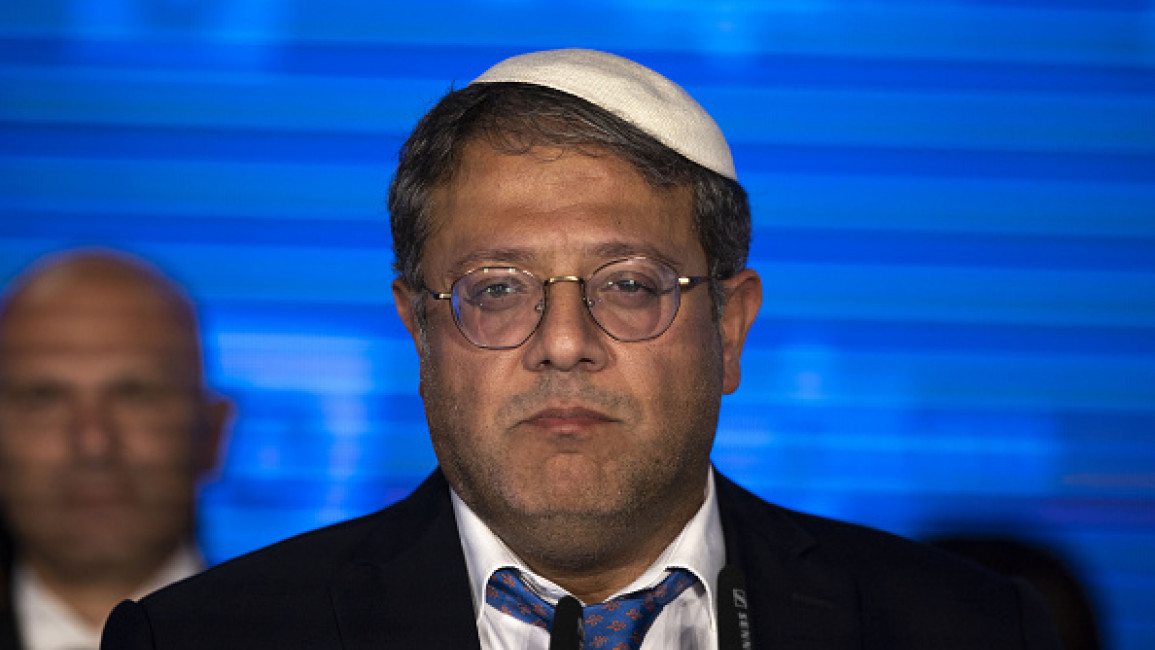Ben-Gvir slammed as Israel dismantles Israel police department tackling murders in Palestinian areas
Israel has dismantled a special department dedicated to fighting high crime and murder rates in 1948 Palestinian areas, in a move viewed as punishment for community leaders' refusal to work with far-right National Security Minister Itamar Ben Gvir.
The department was opened just over a year ago, in response to high murder rates in Palestinian towns and villages inside Israel, which Palestinians believe is due to the deliberate neglect of their communities by Israeli police.
There was only a small drop in murder rates after the department was established, from 126 in 2021 to 111 in 2022, but numbers have rocketed this year since Ben-Gvir was placed in charge of security.
Twenty-six Palestinians were killed in the first two months of 2023 compared to 14 during the same period in 2022.
Tensions between Palestinians and Israeli police are said to have mounted after the appointment of Ben-Gvir, who has a history of incendiary remarks about Palestinians and launched a wave of violent raids in the occupied West Bank, killing at least 65 Palestinians.
"The Arab community doesn't interest Minister Ben-Gvir," Murad Amash, the mayor of Jisr al-Zarqa, told Haaretz.
"He wants to crush us. Even if the entire Arab community in Israel died, it wouldn't interest him. He's here to impose order - which means taking revenge on the Arab community. This doesn't mesh with any kind of desire to fight crime."
Ben-Gvir, who effectively heads police in Israel and the occupied territories, is also pushing through legislation to see the death penalty for some terror offences which Palestinians see as another way of targeting their community.
Mahmoud Nassar, who holds the portfolio for fighting crime and violence at the Council of Arab Mayors, told the Israeli daily that gang leaders in Palestinian communities now feel there are no repercussions for their actions, leading to a spike in crime in these areas.
"Since Ben-Gvir took office, he may say that crime and the Arab community interest him, but he has no organised plan and he’s busy with clashes with the police, demonstrations, and other issues that perhaps interest his electorate," Nasser told the daily.
"This atmosphere leads police to shift to a lower gear against what’s happening in Arab society."
Ben-Gvir has also reduced "slow track" meetings, combining all law enforcement agencies, effectively cutting the National Security Ministry's contact with 1948 Palestinian communities.
Ben-Gvir's office told Haaretz that "crime and violence in the Arab community top the minister’s priorities and he invests a great deal of time in this issue" and police are "constantly working to fight crime in the Arab community".
The National Committee for the Heads of the Local Arab Councils in Israel has refused to work with the policies of Ben-Gvir due his "openly racist, fascist, and inciteful stance" towards Palestinian communities and his "aggressive approach taken towards them".
It released a statement on Thursday evening, pointing to a massive spike in murder rates in Palestinian communities since Ben-Gvir took office and categorically rejected the National Security Ministry's claims that police are confronting violence and crime in Arab communities.
Ben-Gvir was also slammed for referring to this trend as "Arab crime" and comments that his policies aimed at returning "law and order" to these areas.
The Palestinian committee said the ministry's real goal should be to guarantee the security and safety of Arab citizens, as is their right, and called on authorities to urgently tackle the crime wave in an open and transparent way.
Palestinian leaders say that a lack of action by police against intra-Arab crime and the ministry's focus on anti-government protests has enabled crime gangs to feel they have free reign in their communities.



